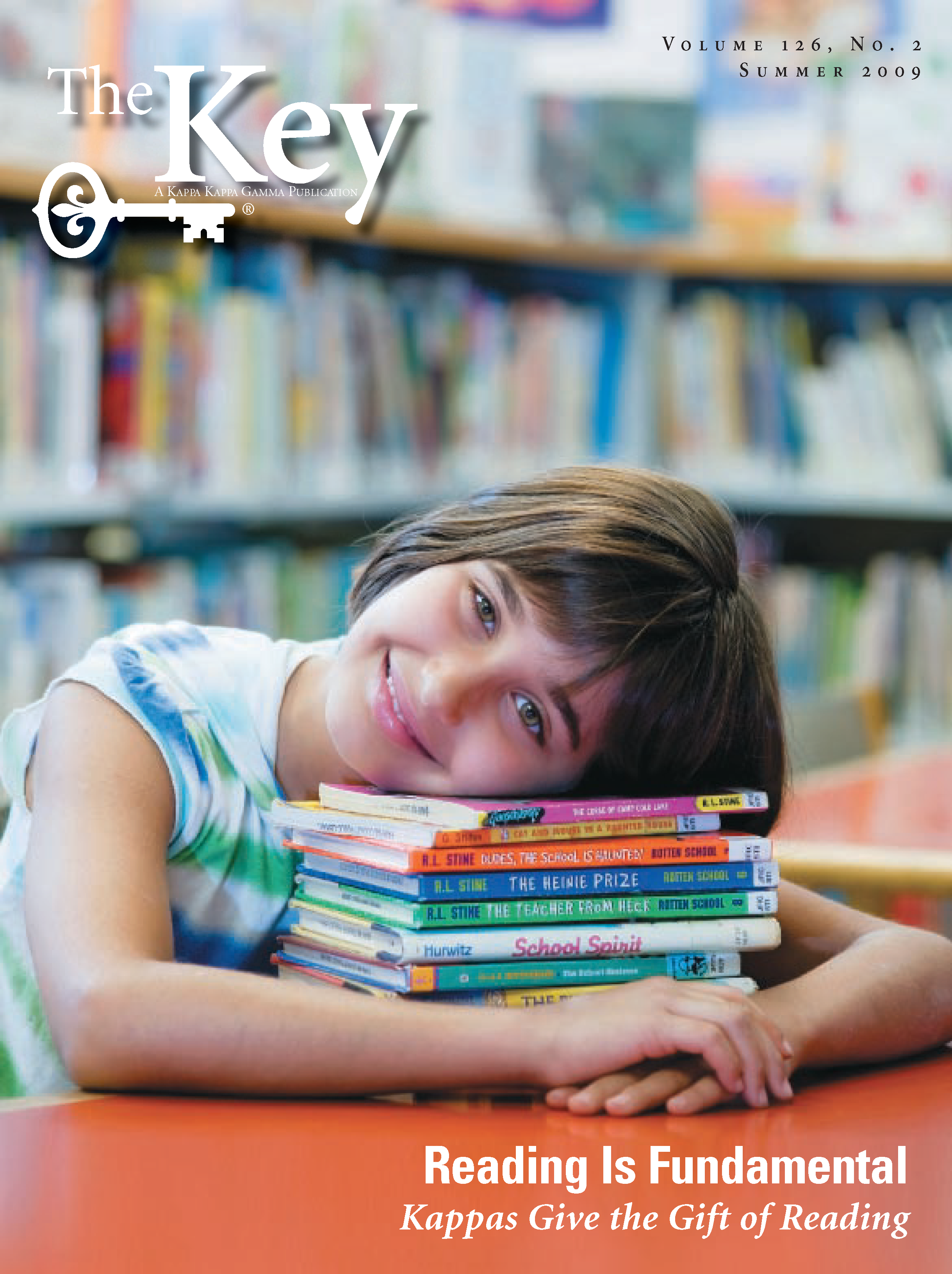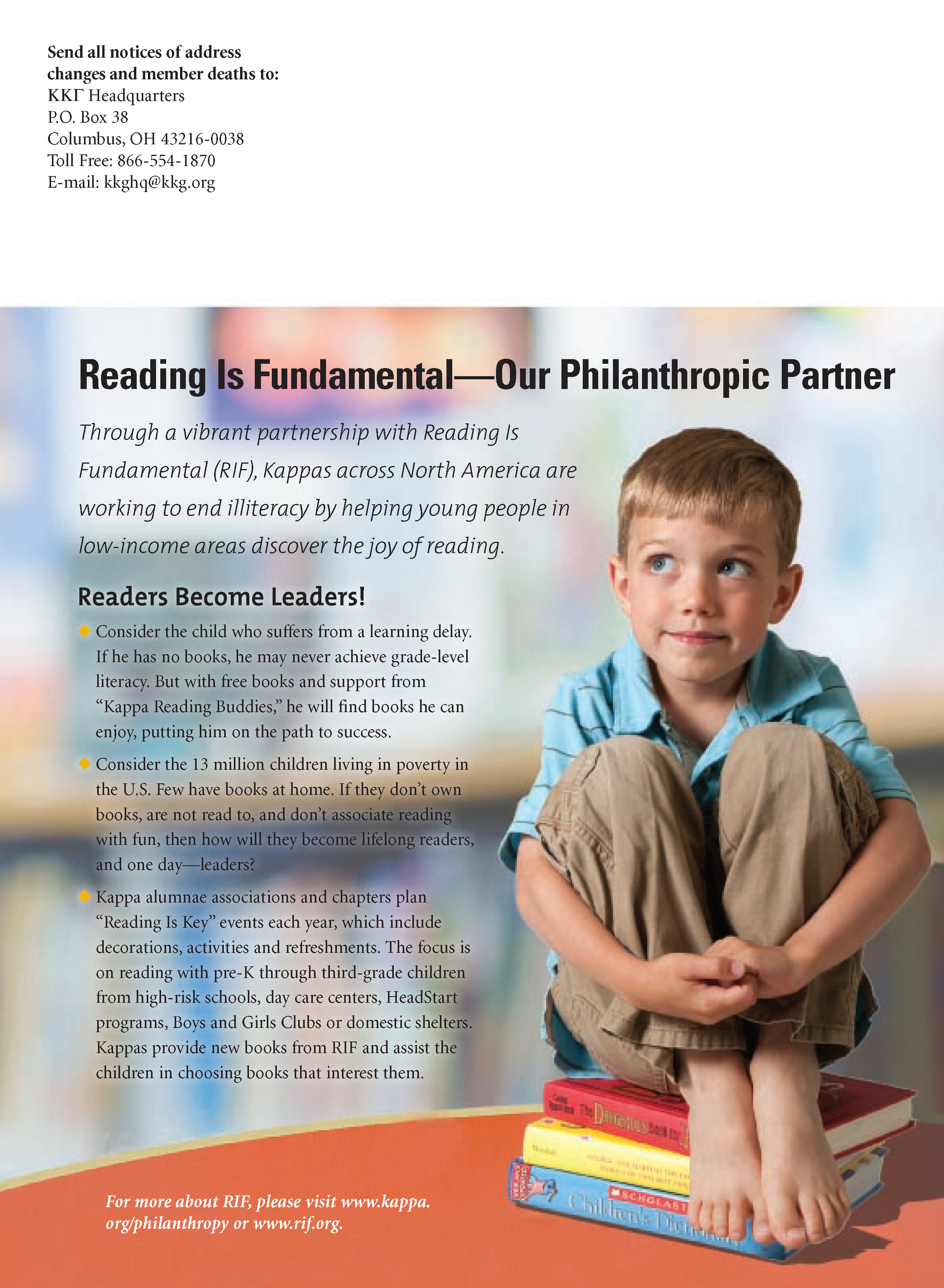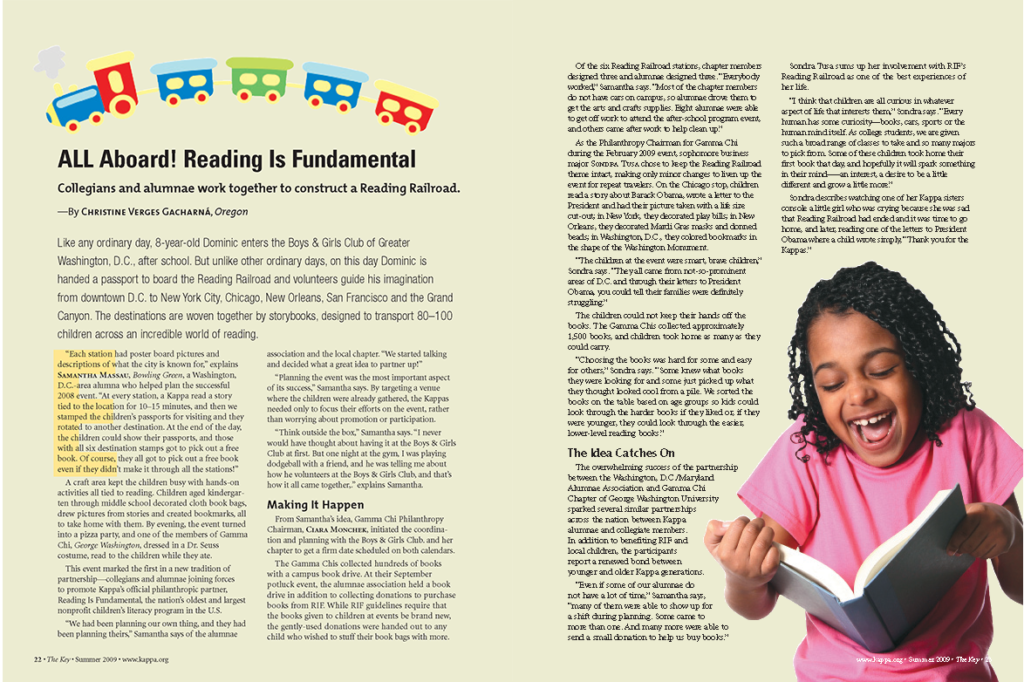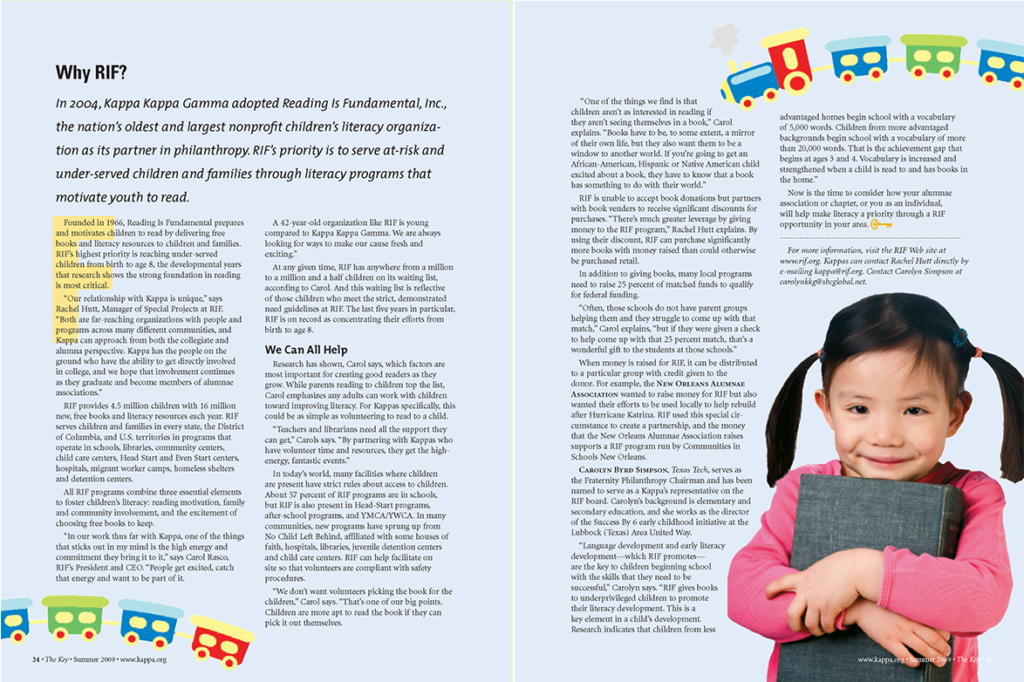Reading is Fundamental


ALL ABOARD! READING IS FUNDAMENTAL
The Summer 2009 issue of The Key is the first time an editor has used me both as a photographer for the cover photo AND as the writer for the cover feature story! That’s my daughter in the picture, my son holding an SB 800 Strobist-style to camera left.
On the back cover is Quinn. All of my clients around the time I was writing this story were photographed as potential cover candidates, but I knew Quinn was a likely winner with those big blue eyes and a shirt to match.
Scroll down for full text.


All Aboard! Reading is Fundamental
Collegians and alumnae work together to construct a Reading Railroad.
—By Christine Verges Gacharná, Oregon
Like any ordinary day, 8-year-old Dominic enters the Boys & Girls Club of Greater Washington, D.C., after school. But unlike other ordinary days, on this day Dominic is handed a passport to board the Reading Railroad and volunteers guide his imagination from downtown D.C. to New York City, Chicago, New Orleans, San Francisco, and the Grand Canyon. The destinations are woven together by storybooks, designed to transport 80–100 children across an incredible world of reading.
Each station had poster board pictures and descriptions of what the city is known for,” explains Samantha Massau, Bowling Green, a Washington, D.C.-area alumna who helped plan the successful 2008 event. “At every station, a Kappa read a story tied to the location for 10–15 minutes, and then we stamped the children’s passports for visiting and they rotated to another destination. At the end of the day, the children could show their passports, and those with all six destination stamps got to pick out a free book. Of course, they all got to pick out a free book even if they didn’t make it through all the stations!”
A craft area kept the children busy with hands-on activities all tied to reading. Children aged kindergarten through middle school decorated cloth book bags, drew pictures from stories and created bookmarks, all to take home with them. By evening, the event turned into a pizza party, and one of the members of Gamma Chi, George Washington, dressed in a Dr. Seuss costume, read to the children while they ate.
This event marked the first in a new tradition of partnership—collegians and alumnae joining forces to promote Kappa’s official philanthropic partner, Reading Is Fundamental, the nation’s oldest and largest nonprofit children’s literacy program in the U.S.
“We had been planning our own thing, and they had been planning theirs,” Samantha says of the alumnae association and the local chapter. “We started talking and decided what a great idea to partner up!”
“Planning the event was the most important aspect of its success,” Samantha says. By targeting a venue where the children were already gathered, the Kappas needed only to focus their efforts on the event, rather than worrying about promotion or participation.
“Think outside the box,” Samantha says. “I never would have thought about having it at the Boys & Girls Club at first. But one night at the gym, I was playing dodgeball with a friend, and he was telling me about how he volunteers at the Boys & Girls Club, and that’s how it all came together,” explains Samantha.
Making It Happen
From Samantha’s idea, Gamma Chi Philanthropy Chairman, Ciara Monchek, initiated the coordination and planning with the Boys & Girls Club and her chapter to get a firm date scheduled on both calendars.
The Gamma Chis collected hundreds of books with a campus book drive. At their September potluck event, the alumnae association held a book drive in addition to collecting donations to purchase books from RIF. While RIF guidelines require that the books given to children at events be brand new, the gently-used donations were handed out to any child who wished to stuff their book bags with more.
Of the six Reading Railroad stations, chapter members designed three and alumnae designed three. “Everybody worked,” Samantha says. “Most of the chapter members do not have cars on campus, so alumnae drove them to get the arts and crafts supplies. Eight alumnae were able to get off work to attend the after-school program event, and others came after work to help clean up.”
As the Philanthropy Chairman for Gamma Chi during the February 2009 event, sophomore business major Sondra Tusa chose to keep the Reading Railroad theme intact, making only minor changes to liven up the event for repeat travelers. On the Chicago stop, children read a story about Barack Obama, wrote a letter to the President and had their picture taken with a life size cut-out; in New York, they decorated play bills; in New Orleans, they decorated Mardi Gras masks and donned beads; in Washington, D.C., they colored bookmarks in the shape of the Washington Monument.
“The children at the event were smart, brave children,” Sondra says. “They all came from not-so-prominent areas of D.C. and through their letters to President Obama, you could tell their families were definitely struggling.”
The children could not keep their hands off the books. The Gamma Chis collected approximately 1,500 books, and children took home as many as they could carry.
“Choosing the books was hard for some and easy for others,” Sondra says. “Some knew what books they were looking for and some just picked up what they thought looked cool from a pile. We sorted the books on the table based on age groups so kids could look through the harder books if they liked or, if they were younger, they could look through the easier, lower-level reading books.”
The Idea Catches On
The overwhelming success of the partnership between the Washington, D.C./Maryland Alumnae Association and Gamma Chi Chapter of George Washington University sparked several similar partnerships across the nation between Kappa alumnae and collegiate members.
In addition to benefiting RIF and local children, the participants report a renewed bond between younger and older Kappa generations.
“Even if some of our alumnae do not have a lot of time,” Samantha says, “many of them were able to show up for a shift during planning. Some came to more than one. And many more were able to send a small donation to help us buy books.”
Sondra Tusa sums up her involvement with RIF’s Reading Railroad as one of the best experiences of her life.
“I think that children are all curious in whatever aspect of life that interests them,” Sondra says. “Every human has some curiosity—books, cars, sports or the human mind itself. As college students, we are given such a broad range of classes to take and so many majors to pick from. Some of these children took home their first book that day, and hopefully it will spark something in their mind—–an interest, a desire to be a little different and grow a little more.”
Sondra describes watching one of her Kappa sisters console a little girl who was crying because she was sad that Reading Railroad had ended and it was time to go home, and later, reading one of the letters to President Obama where a child wrote simply, “Thank you for the Kappas.”
Why RIF?
In 2004, Kappa Kappa Gamma adopted Reading Is Fundamental, Inc., the nation’s oldest and largest nonprofit children’s literacy organization as its partner in philanthropy. RIF’s priority is to serve at-risk and under-served children and families through literacy programs that motivate youth to read.
Founded in 1966, Reading Is Fundamental prepares and motivates children to read by delivering free books and literacy resources to children and families.
RIF’s highest priority is reaching under-served children from birth to age 8, the developmental years that research shows the strong foundation in reading is most critical.
“Our relationship with Kappa is unique,” says Rachel Hutt, Manager of Special Projects at RIF. “Both are far-reaching organizations with people and programs across many different communities, and Kappa can approach from both the collegiate and alumna perspective. Kappa has the people on the ground who have the ability to get directly involved in college, and we hope that involvement continues as they graduate and become members of alumnae associations.”
RIF provides 4.5 million children with 16 million new, free books and literacy resources each year. RIF serves children and families in every state, the District of Columbia, and U.S. territories in programs that operate in schools, libraries, community centers, child care centers, Head Start and Even Start centers, hospitals, migrant worker camps, homeless shelters and detention centers.
All RIF programs combine three essential elements to foster children’s literacy: reading motivation, family and community involvement, and the excitement of choosing free books to keep.
“In our work thus far with Kappa, one of the things that sticks out in my mind is the high energy and commitment they bring it to it,” says Carol Rasco, RIF’s President and CEO. “People get excited, catch that energy and want to be part of it.
A 42-year-old organization like RIF is young compared to Kappa Kappa Gamma. We are always looking for ways to make our cause fresh and exciting.”
At any given time, RIF has anywhere from a million to a million and a half children on its waiting list, according to Carol. And this waiting list is reflective of those children who meet the strict, demonstrated need guidelines at RIF. The last five years in particular, RIF is on record as concentrating their efforts from birth to age 8.
We Can All Help
Research has shown, Carol says, which factors are most important for creating good readers as they grow. While parents reading to children top the list, Carol emphasizes any adults can work with children toward improving literacy. For Kappas specifically, this could be as simple as volunteering to read to a child.
“Teachers and librarians need all the support they can get,” Carols says. “By partnering with Kappas who have volunteer time and resources, they get the high-energy, fantastic events.”
In today’s world, many facilities where children are present have strict rules about access to children.
About 57 percent of RIF programs are in schools, but RIF is also present in Head-Start programs, after-school programs, and YMCA/YWCA. In many communities, new programs have sprung up from No Child Left Behind, affiliated with some houses of faith, hospitals, libraries, juvenile detention centers and child care centers. RIF can help facilitate on site so that volunteers are compliant with safety procedures.
“We don’t want volunteers picking the book for the children,” Carol says. “That’s one of our big points. Children are more apt to read the book if they can pick it out themselves.
“One of the things we find is that children aren’t as interested in reading if they aren’t seeing themselves in a book,” Carol explains. “Books have to be, to some extent, a mirror of their own life, but they also want them to be a window to another world. If you’re going to get an African-American, Hispanic or Native American child excited about a book, they have to know that a book has something to do with their world.”
RIF is unable to accept book donations but partners with book venders to receive significant discounts for purchases. “There’s much greater leverage by giving money to the RIF program,” Rachel Hutt explains. By using their discount, RIF can purchase significantly more books with money raised than could otherwise be purchased retail.
In addition to giving books, many local programs need to raise 25 percent of matched funds to qualify for federal funding.
“Often, those schools do not have parent groups helping them and they struggle to come up with that match,” Carol explains, “but if they were given a check to help come up with that 25 percent match, that’s a wonderful gift to the students at those schools.”
When money is raised for RIF, it can be distributed to a particular group with credit given to the donor. For example, the New Orleans Alumnae Association wanted to raise money for RIF but also wanted their efforts to be used locally to help rebuild after Hurricane Katrina. RIF used this special circumstance to create a partnership, and the money that the New Orleans Alumnae Association raises supports a RIF program run by Communities in Schools New Orleans.
Carolyn Byrd Simpson, Texas Tech, serves as the Fraternity Philanthropy Chairman and has been named to serve as a Kappa’s representative on the RIF board. Carolyn’s background is elementary and secondary education, and she works as the director of the Success By 6 early childhood initiative at the Lubbock (Texas) Area United Way.
“Language development and early literacy development—which RIF promotes—are the key to children beginning school with the skills that they need to be successful,” Carolyn says. “RIF gives books to underprivileged children to promote their literacy development. This is a key element in a child’s development.
Research indicates that children from less advantaged homes begin school with a vocabulary of 5,000 words. Children from more advantaged backgrounds begin school with a vocabulary of more than 20,000 words. That is the achievement gap that begins at ages 3 and 4. Vocabulary is increased and strengthened when a child is read to and has books in the home.”
Now is the time to consider how your alumnae association or chapter, or you as an individual, will help make literacy a priority through a RIF opportunity in your area.
For more information, visit the RIF Web site at www.rif.org.
4 thoughts on “Reading is Fundamental”
Comments are closed.
Christine, you never cease to amaze.
You did such a fabulous job highlighting RIF, I can’t wait to get extra copies of this wonderful piece in the office so I can send to some of our other partners and donors! Thank you for Kappa Kappa Gamma’s support and for developing such a compelling “case for support”! Lynn Croneberger, VP of Development, Reading Is Fundamental
Wow, this is a terrific spread; we are so grateful to you for making RIF come alive and jump from the pages of great words and expressive photographs into the readers’ minds and hearts!
Carol Rasco
President
RIF
Thank you for putting together such a wonderful and informative piece on RIF! We at RIF are honored to be Kappa Kappa Gamma’s national philanthropy and are proud of the partnership the two organizations are creating. For more info on RIF, visit http://www.rif.org.